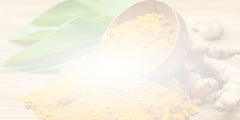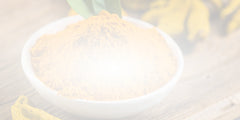
We have spoken a great deal about the benefits of turmeric and curcumin on the body. However, we do not doubt that you might have heard some horror stories surrounding possible toxins. Given turmeric's long history in folk medicine, cuisine, and even fabrics, it is understandable to be cautious before agreeing to put it in your body.
Turmeric has been occasionally accused of being a source of lead poisoning, which is not a pleasant condition. However, whether or not this is a natural part of turmeric content is something that is not as straightforward as it seems.
With all the information about turmeric, one of the worst things out there is misinformation. Wanting to ensure that you are putting something safe into your body is not just reasonable; it is vital. We hope to provide information about the alleged risks of consuming turmeric or its supplements with this article.
What Makes Turmeric What It Is?
The Curcuma longa plant, more commonly known as turmeric, has been around for centuries and has been a staple in many cultures' cuisine and traditions. Most notably, turmeric was most prevalent in India, where the plant originates. There are 45 species of turmeric native to India alone that have all become a part of the commercial use of the plant.
However, what truly makes turmeric such a valued ingredient is the curcumin content, which is responsible for all of the medicinal and nutritional benefits the root offers. It is also directly responsible for the distinct bright yellow coloration for which turmeric is known. This same coloration also enabled its use as a dye for fabrics.
This yellow coloration is more than just an appealing shade for a popular spice or an effective base for dyeing clothing and fabric. Often, the more vivid the color of turmeric, the better the quality. Unfortunately, this has led to an association between brighter turmeric cultivated from heartier stock. While this is not necessarily true, the correlation has more or less corrupted the general perception of what makes for quality turmeric.

A few factors can determine if the turmeric you are purchasing is a quality product that goes beyond the superficial, like its coloration. Unfortunately, the obsession with the pure yellow color has led to some malfeasance on the part of some producers of the root and its products.
Given that the key ingredient of turmeric is curcumin, it is more common for people to seek supplements that specifically focus on administering a concentration of that substance. This is because the curcumin found in raw turmeric is actually devastatingly low. However, for those who prefer to go the traditional route, keeping aware of how lesser vendors attempt to pad their product is vital.
Can You Get Lead Poisoning From Turmeric?
While you might have heard some stories about getting lead poisoning from turmeric, you might be wondering how valid they are. The unfortunate reality is that it is possible to contract lead poisoning from the consumption of turmeric. However, it is only possible under extenuating circumstances. It will not be an issue so long as you are discerning when purchasing a turmeric root or supplement.
A little earlier, we mentioned that the coloration of turmeric is a major draw for prospective purchasers since it is generally associated with a quality yield. Unfortunately, some less reputable vendors are keen to take advantage of this.
There was once a very prevalent issue regarding the adulteration of turmeric by vendors who were more concerned with turning a profit than they were about the safety of their products. Using chemicals, they would alter the coloration or quantity of their yield to artificially produce a more visually appealing product that had long since lost its health value. One of the biggest adulteration scandals occurred in Bangladesh. While the sale of turmeric was always a significant trade in that region, poor yields led to many vendors adding chemicals to improve the overall color of their turmeric.
One of the most common additives was lead chromate. Given its name, it is not difficult to see where the history of turmeric and lead poisoning comes from. Lead chromate was a popular additive for these lesser products since the chemical itself has a bright yellow color. As a result, adding lead chromate to their turmeric yields brightened the latter's color and made it appear as though the curcumin content was higher.

In Bangladesh, turmeric's primary use was for cooking which meant that lead chromate was being ingested by those who had purchased from these lesser vendors. This led to contamination levels that were 500 times higher than the national limit, prompting a rapid investigation into the sudden onset of poisonings. The investigation revealed a chain of events where farmers would sell low-quality turmeric roots to another party who added lead chromate to them. These "polishers" went on to resell the adulterated turmeric to wholesalers who, in turn, sold them to markets for the average citizen to add to their grocery carts.
Therefore, it is possible to suffer from lead poisoning due to the consumption of turmeric. However, the caveat is that the turmeric would have to come from a vendor who tampered with the root before selling it. So, the odds of suffering from such poisoning are extremely rare for most markets since the adulteration of turmeric is now strictly monitored and prohibited by government bodies.
In and of itself, turmeric does not possess a natural concentration of lead and will not cause lead poisoning itself. Rather, the only chance you will have of suffering from lead poisoning from this root would be the result of human intervention. However, there are ways to measure the quality of your turmeric roots or powder if you have concerns.
How to Determine the Quality of Turmeric
Checking the quality of a product before you purchase it is a more common practice than most people are led to believe. This is especially true of produce. After all, when was the last time you saw someone blindly put a watermelon or a bunch of bananas in their shopping cart without checking how ripe they are?
Some measures can be taken to check the quality of turmeric before you consume it. Ordinarily, one of the most common tests for the quality of curcumin does involve checking the color. However, since we now know that some parties are willing to use chemicals to circumvent this test, finding alternatives might be prudent.
One way to check for unwanted additives to your turmeric is as simple as putting some of it in the palm of your hand. Pure turmeric will stick to your hand and stain the skin yellow or orange, depending on the coloration of the powder. Even when you tilt your palm, only a small amount of the turmeric should fall off, with the vast majority remaining firmly stuck to your palm. If large clumps of turmeric fall off your palm, there is likely an additional ingredient you do not want to be putting in your body.

Another popular test option is the smell test. A little self-explanatory, but the scent can tell you a great deal about the quality of the product overall. Curcuma longais closely related to the simple ginger root and, therefore, possesses a similar scent. If you detect a gingery aroma when giving your turmeric powder a sniff, that should serve as an indicator that the powder itself is clean and not adulterated. Conversely, if it has a scent that is difficult to identify but can be identified as unnatural, then the odds are good that you have poor turmeric or turmeric that has several unwanted additives.
Finally, there is one last test that is a little more definitive compared to the scent test. All you need for this one is a glass of water at room temperature. Take a teaspoon of the powder and dump it into the water without stirring, shaking, or otherwise mixing it. After about 20 minutes, check the glass again. If the turmeric has settled at the bottom of the glass once the 20 minutes are up, you have genuine, natural turmeric. If the water is cloudy, however, then there are likely ingredients that have been added to the turmeric by the original vendor.
Each of these tests could help you determine whether the turmeric you have purchased is safe for consumption. While they do require you to access the turmeric, which means you will likely have purchased it, proving it has been adulterated keeps you healthy and safe. Furthermore, if the contaminants are revealed to be toxic, like lead chromate, you can likely have the vendor apprehended.
Is Turmeric Inherently Dangerous?
Lead poisoning is already a hazardous condition to suffer from, yet you might be concerned about turmeric's potential hazard all by itself. This is an understandable stance given the knowledge that some vendors were so willing to introduce literal toxins to their produce solely for the sake of the product. Fortunately, there is good news insofar as the safety of consuming turmeric is concerned.
The vast majority of issues associated with turmeric are manmade and should not be of much concern if you go through a reputable vendor. However, a few conditions of the human experience might cause some issues when turmeric is introduced. These particular side effects are dependent on underlying conditions that exist within the consumer more so than the root itself—starting with the fact that turmeric has a 2% concentration of oxalate. While this is not harmful in and of itself, it might contribute to the manifestation of kidney stones in those who are predisposed to them.

Aside from this, the only major issue lies in those with a gluten allergy. Many commercial turmeric powders use wheat, rye flour, or barley as fillers for the powder. While these are all perfectly safe for consumption, those with gluten allergies might want to read the packaging carefully for signs of these fillers. Otherwise, you risk experiencing an allergic reaction to those sources of gluten found in the powder.
Otherwise, turmeric is considered safe for general consumption with minimal risk. Obviously, it is not recommended to overconsume turmeric under any circumstance. But this is more to do with the fact that too much of anything can have adverse effects.
The Nu You
Turmeric has risen to relative stardom in the world of health supplements. However, no good thing rises to the top without a little baggage. The idea of lead poisoning from turmeric is a concern risen from previous controversies from adulteration. There have been unfortunate instances of poor decisions coming from those who allowed greed to dictate the quality of the products they sell. However, this is an issue easily avoided by simply making sure the source of your turmeric is reputable and not a secondhand vendor with no regulation.
While turmeric root and powder might be more appealing to you, it is worth reiterating that the curcumin content in raw turmeric is minimal. Therefore, it might be in your best interest to consider using curcumin supplements instead since they offer all the benefits of turmeric with a high concentration and have far less risk since most supplements cannot be adulterated for the sake of coloration. However, finding a reputable vendor for even curcumin supplements is important. To that end, we at NuVitality are here to help.

We offer curcumin supplement capsules that have all the benefits of turmeric without the guesswork about purity. The only supplement we add is black pepper, which is known to enhance the health benefits of curcumin. So, if you want to get the most out of what makes turmeric so valuable, check out our website today and take the 1st step to the Nu healthier you.
Do you have any questions about anything mentioned in today's article, or about turmeric in general? If so, please feel free to reach out and contact us at any time! We'd be more than happy to answer any questions you may have about turmeric, or what it can do for your health!






